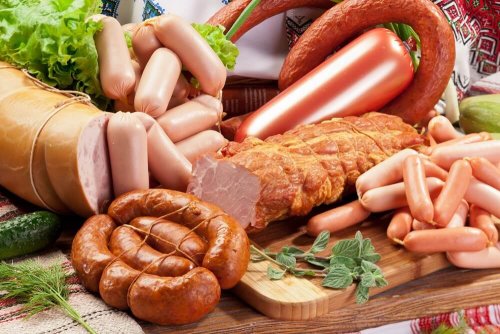7 Eating Tips for Gastroesophageal Reflux (GERD)


Reviewed and approved by the doctor José Gerardo Rosciano Paganelli
Eating well is key to keeping gastroesophageal reflux in line. While other measures and habits are needed, eating a healthy diet can keep your digestive system under control, especially if you have GERD.
It develops when stomach acids move up towards the esophagus and mouth due to a weakening in the esophageal sphincter. People describe the feeling as a burning sensation underneath the sternum, sometimes with abdominal pain and heartburn.
Although it’s usually mild and is only rarely a sign of serious illness, it does deserve attention because otherwise it could become chronic. Therefore, it’s important that you make preventative changes to your diet in addition to following medical advice.
What causes gastroesophageal reflux?

The main cause of gastroesophageal reflux is excessive production of stomach acids. These acids cause inflammation and weaken the muscles that surround the lower part of the esophagus (the esophageal sphincter), allowing them to pass through.
Risk factors
- Being overweight or obese (increase in intra-abdominal pressure)
- Pregnancy
- Problems with esophageal emptying
- Hiatal hernia
- Underdeveloped cardia
- Stomach surgery
- Disorders of the connective tissue, such as sceroderma
- Smoking or drinking
- Consuming spicy or otherwise irritating foods
- Drinking coffee and other stimulants
- Certain medications, such as aspirin
We also recommend reading:
Symptoms of gastroesophageal reflux
A strong burning sensation in the chest, usually after eating, is the most common symptom of GERD. However, this generally comes along with other symptoms that can last for hours.
- Chest pain
- Swallowing problems
- Regurgitation of bitter food or liquids
- Feeling like there is a knot in your throat
- Chronic cough
- Sleep problems (if reflux happens at night)
How to treat gastroesophageal via diet
Changing your eating habits can help prevent and treat gastroesophageal reflux. We can’t ignore the fact that it often comes from eating an unhealthy diet with too many acidic, irritating foods.
So, what should you eat and drink?
1. Drink aloe vera juice

The soothing antacid quality of aloe vera juice can help treat GERD naturally. It neutralizes acids in your digestive system and helps restore proper pH levels.
Among other things, aloe vera has anti-inflammatory and regenerative effects that reduce irritation of your stomach lining, which is important if you want to prevent complications like ulcers and gastritis. However, it should be taken in moderation, since it acts as a laxative.
2. Limit your consumption of irritating foods and drinks

Eating a diet full of irritating foods is a common cause of gastroesophageal reflux. So if you want to treat it and keep it from coming back, you must limit your consumption of such foods as much as possible.
The most common triggers are:
- Processed meat
- Refined flour
- Sweets and pastries
- Spicy seasonings
- Canned food
- Fried foods and chips
- Garlic and onions
- Citrus fruits and tomatoes
- Coffee and other sources of caffeine
- Whole-fat dairy products
- Butter and vegetable fat
3. Eat five times a day

The good habit of eating five small meals a day also correlates with improved GERD symptoms. Eating less food at once makes digestion easier and produces less acid.
4. Chew your food well
Eating slowly and chewing your food well is an important part of treat gastroesophageal reflux. While many people overlook this simple tip, swallowing food in large pieces makes digestion harder and increases stomach acid levels.
5. Consume probiotics

Foods with probiotics contain “live cultures” of bacteria, and this helps keep your stomach pH in balance. Thus, when stomach acid is causing reflux, it’s an excellent idea to increase your consumption of probiotics.
Options include:
- Kefir
- Natural yogurt
- Sauerkraut
- Fermented pineapple
- Lacto-fermented onions
You may also be interested in this article:
What are Probiotics Used For?
6. Drink water with lemon on an empty stomach

7. Don’t eat right before bed

One habit that triggers GERD is eating large, rich, or irritating meals before going to bed. Although it may seem harmless, this encourages stomach acids to move towards your mouth, setting off other digestive problems.
Since your body is horizontal when you sleep, acids can go up your esophagus more easily. Thus, it’s best to not eat for three hours before going to bed, and even then only eat a light meal.
Do you get reflux a lot? In addition to following these tips, don’t forget to deal with stress and avoid smoking. If the problem doesn’t go away, see a doctor to find out if there is another underlying cause.
All cited sources were thoroughly reviewed by our team to ensure their quality, reliability, currency, and validity. The bibliography of this article was considered reliable and of academic or scientific accuracy.
- Panahi Y., Khedmat H., Valizadegan G., Mohtashami R., et al., Efficacy and safety of aloe vera syrup for the treatment of gastroesophageal reflux disease: a pilot randomized positive controlled trial. J Tradit Chin Med, 2015. 35 (6): 632-6.
- Valitova ER., Bayrakçy B., Bor S., The effect of the speed of eating on acid reflux and symptoms of patients with gastroesophageal reflux disease. Turk J Gastroenterol, 2013. 24 (5): 379-81.
- Cheng J., Ouwehand AC., Gastroesophageal reflux disease and probiotics: a systematic review. Nutrient, 2020.
This text is provided for informational purposes only and does not replace consultation with a professional. If in doubt, consult your specialist.








